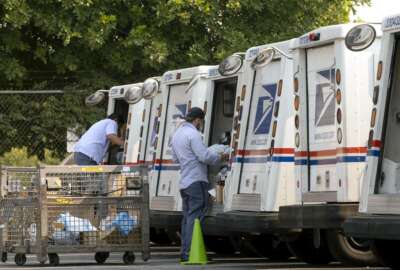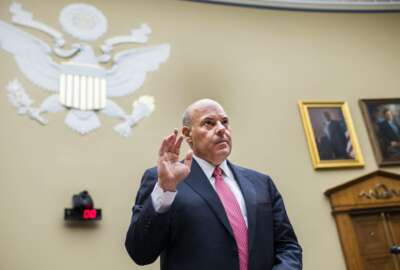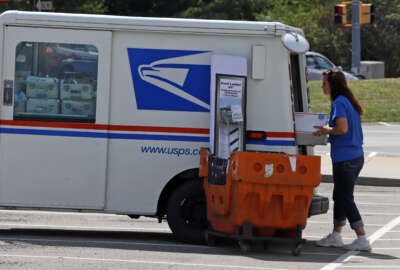USPS board’s governors now mostly Biden picks following latest Senate confirmations
The Postal Service is adding new members to its board at a time when the agency is looking to implement sweeping reforms and advance one of the largest acquisitions...
The Postal Service is adding new members to its board at a time when the agency is looking to implement sweeping reforms and advance one of the largest acquisitions of vehicles in the federal government.
The Senate, in a voice vote Thursday, confirmed President Joe Biden’s two latest members to the USPS Board of Governors.
Dan Tangherlini, the former head of the General Services Administration, will serve a term that lasts through December 2027. Derek Kan, a former deputy director of the Office of Management and Budget, will serve on a term through December 2028.
Once Tangherlini and Kan are sworn in, a majority of the nine presidentially appointed, Senate-confirmed seats on the USPS Board of Governors will be Biden nominees.
Postmaster General Louis DeJoy and Deputy Postmaster General Doug Tulino also serve on the board.
The Senate in May 2021 confirmed three other Biden picks: Ron Stroman, a former deputy postmaster general, Anton Hajjar, former general counsel of the American Postal Workers Union and Amber McReynolds, the chief executive officer of the nonprofit National Vote at Home Institute and the former director of elections in Denver.
Both of Biden’s latest picks will replace two of former President Donald Trump’s nominees: former board chairman Ron Bloom and John Barger, a member of the board since August 2019.
Bloom’s term, plus an additional holdover year, expired last December. The board in January unanimously elected Roman Martinez IV to serve as its current chairman.
Barger, however, continued to serve on the board in a holdover capacity until the Senate confirmed his successor.
DeJoy, in a recent board meeting, thanked Barger for his service to USPS.
“Governor Barger, your enthusiasm for the organization, support for our leadership team, and specifically your support for me during extraordinary times has been an important ingredient to the many accomplishments we have made over the last two years,” DeJoy said. “You leave us, having made an impression on the organization that will survive your tenure.”
Tangherlini and Kan will oversee USPS at a critical point in its operations.
Biden last month signed the Postal Service Reform Act, which will save the agency $107 billion — roughly half now, and the rest of the next 10 years. The legislation, among other things, requires the agency to create a data dashboard meant to track USPS service performance.
Both Tangherlini and Kan told the Senate Homeland Security Committee during their confirmation hearing in March that the dashboard would help the agency address the root cause of delayed mail.
Kan, currently the chief business officer of the e-commerce fulfillment company Deliverr, said the dashboard would give the board “additional clarity” around USPS service problems.
The Postal Service Reform Act also directs USPS to make its network of post offices serve as a storefront for state and local government services.
“The Postal Service currently operates one of the largest pieces of infrastructure in the world today. I think figuring out ways to monetize that infrastructure, leveraging it, could be a way to increase top-line revenue,” Kan said.
Congress wants new environmental analysis of USPS vehicles
USPS also faces intense scrutiny over its plans for a next-generation delivery vehicle fleet made up of mostly gas-powered vehicles.
The House Oversight and Reform Committee advanced a bill Wednesday that would require USPS to conduct a new environmental impact statement (EIS), which accounts for the costs and benefits of electric and gas-powered vehicles in its future fleet.
USPS said in a recent statement that the legislation “takes steps in exactly the wrong financial and operational direction,” and threatens to delay the rollout of the vehicles it has already ordered.
Committee Chairwoman Carolyn Maloney (D-N.Y.) said USPS underestimates the benefits of electric vehicles in its current environmental analysis and lowballs the future price of gasoline.
Maloney is also asking USPS to turn over several key documents regarding its next-generation fleet, including a full, unredacted copy of the total cost-of-ownership analysis for both electric and gas-powered vehicles.
The White House Council on Environmental Quality and the Environmental Protection Agency have challenged the agency’s environmental assumptions that underpin its next-generation fleet.
USPS is also facing three separate lawsuits over its next-generation fleet. The lawsuits led by 16 states, environmental groups and the United Auto Workers seek to prevent USPS from taking any further action under its next-generation delivery vehicle contract, until it conducts a more in-depth environmental review.
USPS has committed to making electric vehicles at least 10% of its next-generation fleet, and expects to purchase more if additional funding becomes available.
USPS recently spent nearly $3 billion on 50,000 next-generation vehicles as part of its initial order to the vendor Oshkosh Defense. More than 10,000 vehicles as part of that initial order are electric vehicles.
Tangherlini and Kan didn’t commit to setting higher electric vehicle targets for USPS, but said they would ensure the agency has the necessary infrastructure for electric vehicles.
“At its core, it doesn’t matter what the vehicle is, as long as the mail is getting to people’s residences,” Tangherlini said.
Kan said one challenge in USPS acquiring electric vehicles is making sure it has the necessary charging infrastructure in the area.
“If we buy 10,000 electric vehicles and we deploy them to Montana, or to some rural parts of the country, there may not be the electrification of the grid to support these vehicles. I think a major pitfall is ensuring that all of the components needed for a procurement are in place,” Kan said.
Copyright © 2025 Federal News Network. All rights reserved. This website is not intended for users located within the European Economic Area.
Jory Heckman is a reporter at Federal News Network covering U.S. Postal Service, IRS, big data and technology issues.
Follow @jheckmanWFED






